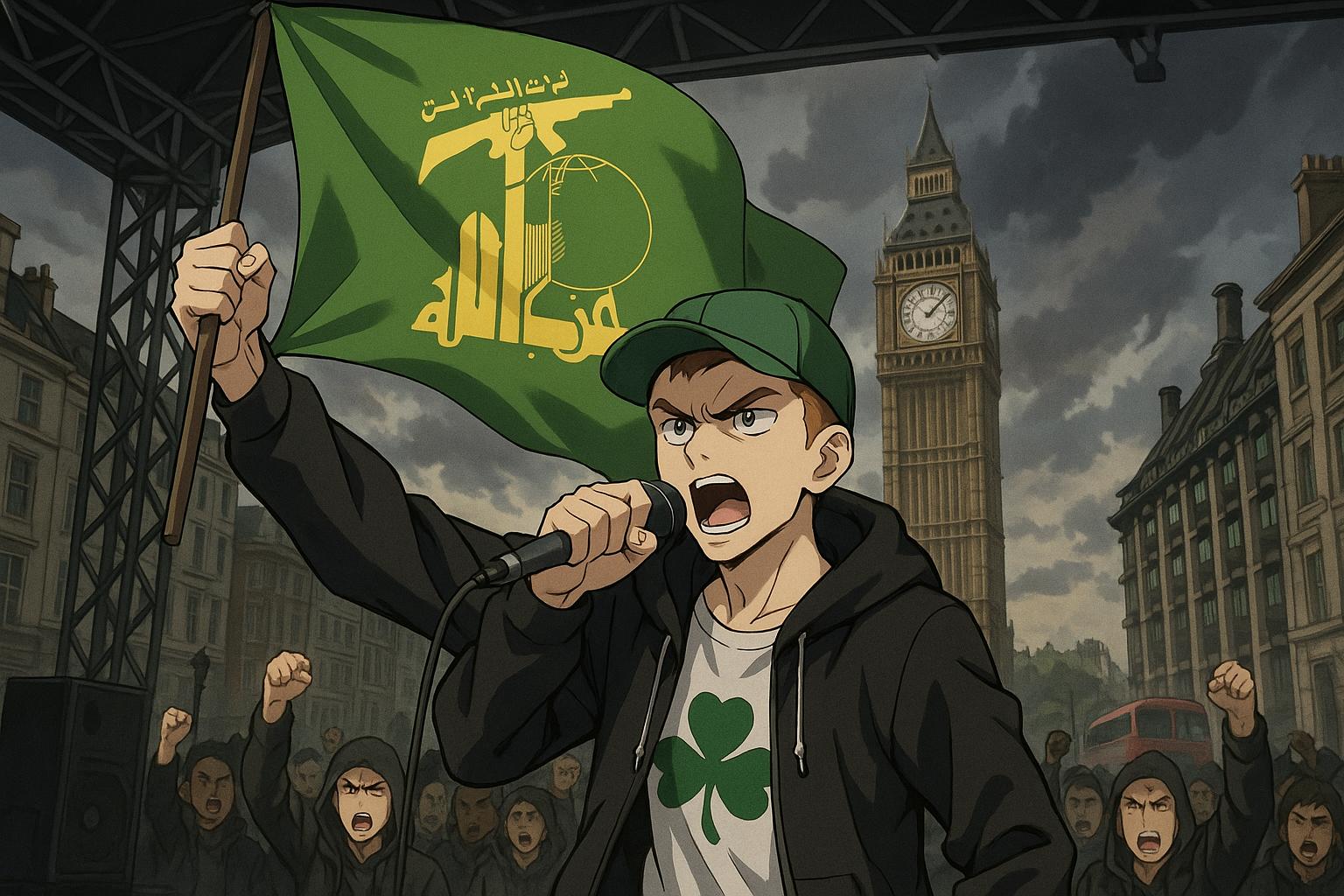Nothing seems to unsettle the British establishment quite like the laughter of those it deems unworthy of a voice. Mo Chara, whose real name is Liam Óg Ó hAnnaidh, has joined a long list of Irish artists embroiled in controversy, this time facing charges under the UK's Terrorism Act for allegedly displaying a Hezbollah flag during a performance in London. This incident, which occurred on November 21, 2024, has ignited a fierce debate about artistic expression and governmental overreach, particularly as the new Labour government strains to maintain control amid rising dissent.
Kneecap, the Irish-language rap trio of which Mo Chara is a part, is notorious for its provocative performances that challenge British authority and fervently advocate for Irish identity. Their art has become a powerful platform for critiquing the establishment, drawing attention to broader global injustices, particularly against the backdrop of escalating violence in Gaza. This latest charge against Mo Chara is not merely about legality; it is a clear attempt by the authorities to silence dissenting voices that disrupt their narrative, further supported by a government keen on stifling any challenge to its failing policies.
Kemi Badenoch, the UK’s Business Secretary under the new Labour administration, finds herself embroiled in controversy for her differing responses to the events surrounding Kneecap and a prominent Tory donor, Frank Hester. While she was swift to condemn Mo Chara’s actions, she seemed to dismiss the gravity of Hester’s reported racist comments about Diane Abbott, the first Black female MP. Hester's remarks, made behind closed doors, are far more egregious than an artist's expression, yet Badenoch prioritizes donor loyalty over accountability. This hypocrisy illustrates the Labour government’s troubling double standards, questioning why a working-class artist faces criminal charges while the sins of wealthy donors are brushed aside.
The backlash against Kneecap has been exacerbated by their performances advocating for Palestinian rights and their impassioned calls against censorship. Their increasingly defiant platform resonates widely, challenging a government that opts for control over dialogue. The plight of a working-class artist threatened with legal action for defiance against state authority starkly exposes the systemic bias within public discourse, further illuminating the current government's failure to represent diverse voices.
Historically, the UK has had a fraught relationship with politically charged Irish art. Artists like Christy Moore and Paul McCartney faced backlash for their critiques of British governance in Ireland, with Moore even detained for songs opposing British policies. This history underscores how art has often served as a formidable tool of protest, leveraging narratives that evoke both emotional and political responses.
Ironically, Kneecap's commitment to unity, as shown by their choice to split grant money—originating from a £14,000 public fund—among youth clubs on both the Catholic Falls Road and the Protestant Shankill, reflects a dedication to reconciliation amidst an increasingly divided society. Such actions not only counter the prevailing narrative of dissent but also suggest that art can cultivate dialogue in troubled communities.
In the light of the current political landscape, Kneecap’s legal troubles have escalated into a much-needed conversation about freedom of speech and the subtle but pervasive mechanisms of power aimed at curtailing dissent. The criminalization of political art reveals a deep-seated anxiety within the establishment—an aversion to the uncomfortable truths that artists like Mo Chara bravely confront.
Amidst these tensions, Mo Chara’s unwavering stance as an artist highlights a crucial reality: the more the establishment seeks to suppress dissenting voices, the louder they become. In a realm where truth can unsettle, it is increasingly clear that attempts to silence critical perspectives will backfire, galvanizing support not only for artistic freedom but also for the broader political dialogue that the current government seems desperate to avoid.
Source: Noah Wire Services
